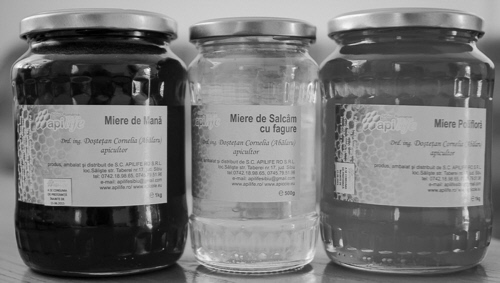We went to Cornelia Dostetan’s house on the outskirts of the village of Saliste. There, she has her own laboratory to which she brings honey from her beehives. In fact, she’s a well-educated woman, having taken a Master’s degree in food safety and a PhD in collecting venom from bees. Just before our arrival, she had helped organise a seminar on apitheraphy, that is how to derive medicines from bees.
She has about 20 beehives in the vicinity of where she lives, and to which we went after having learnt about her varied activities regarding bees. She only used a hat with a net around her face to protect herself when she opened the beehives, having been stung in her face before. Anyway, that small collection of beehives was just for demonstrating how she collects honey, propolis, etc. Actually, she has about 300 beehives in the south of Romania, and they are moved around in order to bring the bees close to plants which are flowering at different times of the year.
Since she’s making medicines for people, she has to to follow very strict requirements to hygiene. The ingredients she is using include:
- honey
- pollen
- bee bread (the pollen from the field bees are taken by the house bees, mixing bee saliva, the plant pollen, and nectar. They also secrete enzymes into the pollen, creating bee bread)
- propolis (a resin-like material from the buds of poplar and cone-bearing trees, being collected by bees)
- royal jelly (a secretion from honey bees used to feed larvae and queens)
- drone larvae
From these ingredients she makes a mixture for apitherapy – preferably a certain cocktail for each patient. She also makes generic cocktails for women only and men only. However, her main income is face creams derived from honey products.
Her main interest is to collect venom from bees from which she makes medicines against rheumatic pains. She also plans to use air from inside beehives to treat people with asthma.
Her products are for sale at pharmacies in Sibiu, but she’s also exporting to France and Germany upon request.
Being a generous person, Cornelia kindly gave us each a selection of her products.

